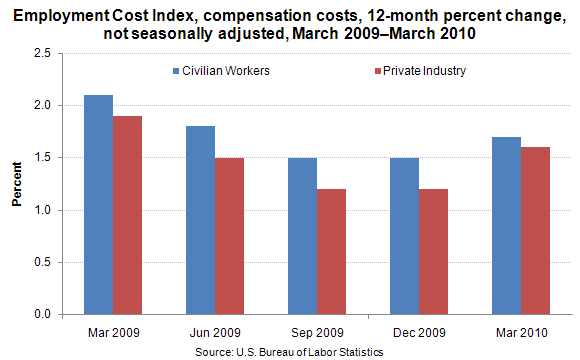May 04, 2010 (The Editor’s Desk is updated each business day.)
Compensation costs in March 2010
Compensation costs increased for both civilian workers and private industry workers in March 2010 on a 12-month, not seasonally adjusted basis. Wages and salaries make up about 70 percent of compensation costs, while benefits make up the remaining 30 percent.

[Chart data]
Compensation costs for civilian workers increased 1.7 percent, not seasonally adjusted, for the 12-month period ending March 2010. This was smaller than the 2.1-percent increase for the 12-month period ending in March 2009.
Compensation costs for private industry workers increased 1.6 percent for the same period, not seasonally adjusted, compared to 1.9 percent for the 12-month period ending March 2009. Employer costs for health benefits increased 4.5 percent for the 12-month period ending March 2010. In March 2009, the 12-month percent change was 4.6 percent.
These data are from the BLS Employment Cost Trends program. To learn more, see "Employment Cost Index – March 2010" (HTML) (PDF), news release USDL-10-0535. The Employment Cost Index (ECI) measures the change in the cost of labor, free from the influence of employment shifts among occupations and industries. Benefits costs include paid leave, supplemental pay, insurance benefits, retirement and savings, and legally required benefits. Paid leave benefit costs include employer costs for vacations, holidays, sick leave, and personal leave.
Related TED articles
Benefits |
Compensation costs |
Earnings and wages
Of interest
Spotlight on Statistics: National Hispanic Heritage Month
In this Spotlight, we take a look at the Hispanic labor force—including labor force participation, employment and unemployment, educational attainment, geographic location, country of birth, earnings, consumer expenditures, time use, workplace injuries, and employment projections.
.
Read more »
